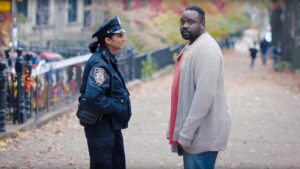The Outside Story
Posted on May 4, 2021 at 2:17 pm
A-| Lowest Recommended Age: | Mature High Schooler |
| MPAA Rating: | Not Rated |
| Profanity: | Strong language |
| Alcohol/ Drugs: | None |
| Violence/ Scariness: | Mild, including arrest of a Black Man |
| Diversity Issues: | Diverse characters |
| Date Released to Theaters: | April 30, 2021 |

It takes a long time to make a film, from concept to screenwriting to financing, casting, and shooting and distribution. Even the fastest, lowest-budget film takes months, if not years. You’re always creating something for an audience in a future you cannot predict. And yet the magic of the best films is that they arrive at exactly the right time.
“The Outside Story,” a slim little gem under 90 minutes long, is about a man who leaves his apartment after a long time inside, and it comes just as many of us are venturing out of our homes post-vaccination, almost having forgotten what it feels like to be out in the world, blinking and disoriented like the returnees at the end of “Close Encounters of the Third Kind.” And here, gently encouraging us, is this love letter to its characters, its performers, its Brooklyn setting, and to going outside into the world.
Bryan Tyree Henry has been a standout in films like “If Beale Street Could Talk” and “Widows,” on television in “Atlanta” and other shows, and on Broadway, where he was nominated for a Tony for his performance in “The Book of Mormon.” In his first lead role, he is never less than outstanding as Charles, a man whose ambitions have shrunk as he has been more and more homebound. Once working on a documentary about artificial intelligence and being a friendly and outgoing attendee at parties (where he brought homemade desserts), he now works for Turner Classic Movies putting clips together for pre-obituary tributes to filmmakers and actors who seem like they might die soon. A (fictitious) big star named Gardner St. James is reportedly near death and Charles’s boss is sending him a series of urgent texts insisting he send the tribute in immediately, but Charles is still tinkering with it, trying to get one last clip to convey the star’s career.
Charles is also distracted and depressed. He has just broken up with his long-time girlfriend Isha (a radiant Sonequa Martin-Green), because she cheated on him. He is waiting for her to pick up her stuff, but, per the central imperative that rules the lives of New Yorkers, he has promised to move her car to comply with the alternate side-of-the-street rules and keep her from getting a ticket. When his take-out food order arrives, he doesn’t have enough money on hand for a tip, annoying his regular delivery guy. Back in his apartment, he discovers some extra cash in a pants pocket, and goes running after the delivery guy in his stocking feet to give him a tip. He grabbed his keys on the way out of the door, but it turned out they weren’t his keys; they were his ex’s car keys. And he is locked out.
The guy who would not leave the apartment cannot get back in. And the rest of the movie is just his encounters as the day goes on with neighbors who mostly had never seen him before. Each one is a little haiku of a scene, gorgeously acted, especially by Sunita Mani (“GLOW”) as the cop issuing parking tickets, Lynda Gravatt as a feisty widow, and the superb Olivia Edward as a young girl living with a mother who is somewhere on the continuum between high-strung and disturbingly unstable. The smart script by writer/director Casimir Nozkowski unfolds with distinctive, illuminating details (I love Charles’ job) and subtle shifts in Charles’s attitude, as he begins to open up to the world.
Henry is a knock-out in the role, utterly present for everything the outside world throws at Charle, adjusting to each situation initially in whatever way he thinks will help him get back inside, though not always hiding his frustration, and then starting to listen, to find ways to help others, to connect. It is like watching a flower bloom in time-lapse photography. When he is unexpectedly given a chance to hear some music, it is powerfully moving to see him so moved. Flashbacks give us insight into his relationship with Isha, and how it relates to where Charles is now and what he is learning.
Increasingly, some of my favorite films can be described as “Nothing happens. And everything happens.” That’s this film, and it is a joy to watch.
Parents should know that this film includes explicit sexual references, including infidelity and polyamory, and some strong language. A parent appears to be unstable and abusive.
Family discussion: What changes for Charles during the day and why? Why didn’t Charles want to go outside? Have you ever been locked out? What did you do?
If you like this, try: “Columbus,” “Pieces of April,” and “The Day-Trippers”
